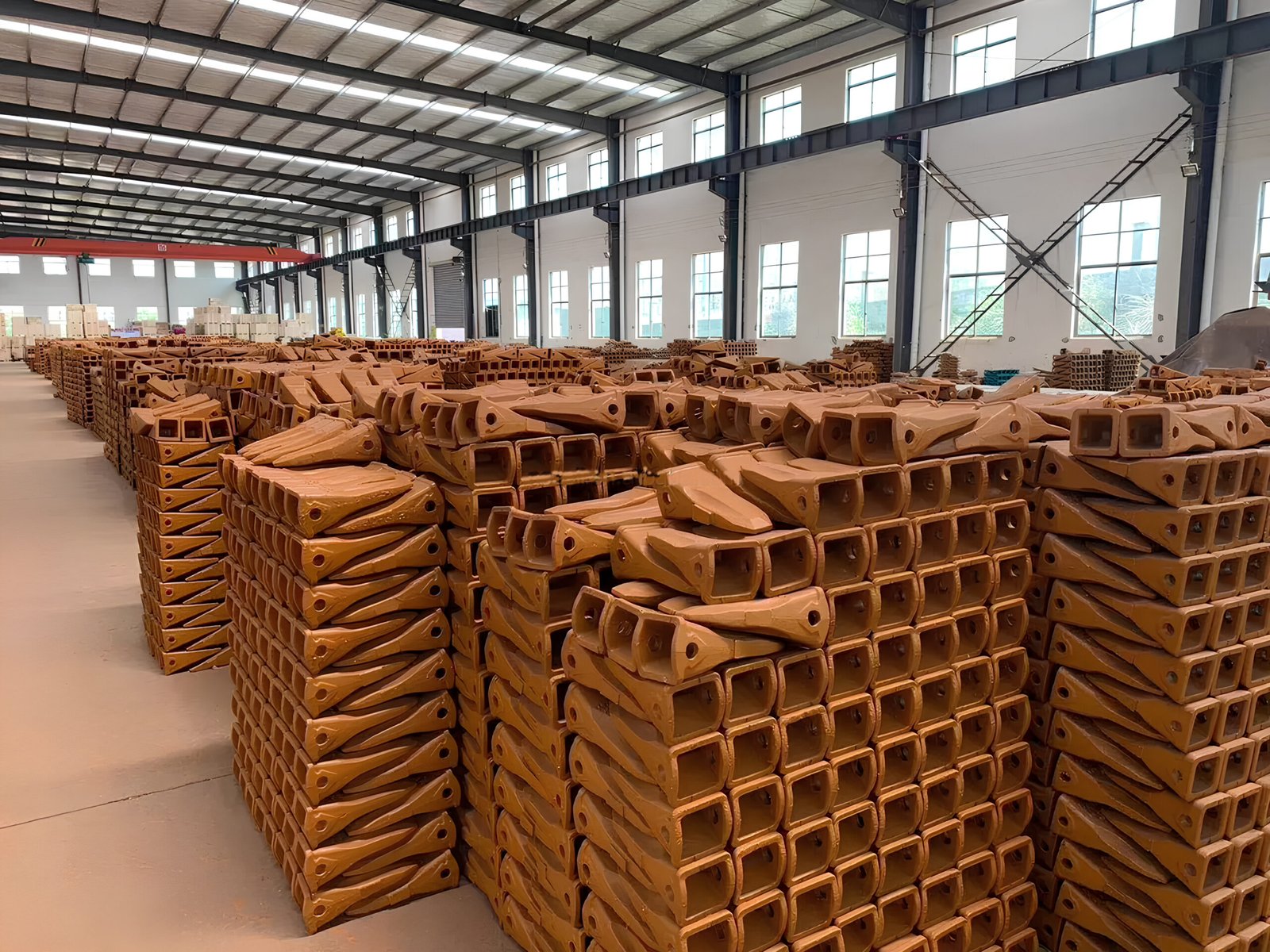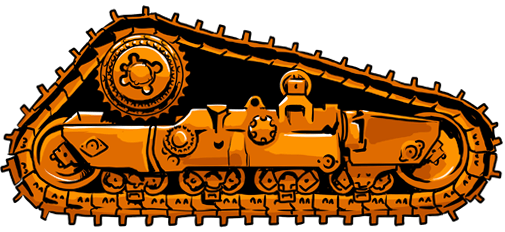Bucket teeth, sometimes referred to as bucket tips or points, are one of the most essential wear components installed on excavator, loader, and backhoe buckets. Their primary function is to cut into and break up soil, rock, or other materials, transferring force from the machine to the ground. As a frontline component in digging, trenching, mining, and construction operations, bucket teeth directly affect the productivity, fuel efficiency, and wear life of the equipment.
In this comprehensive introduction, we explore the structure, functions, types, materials, manufacturing processes, selection criteria, and maintenance of bucket teeth. This guide will help buyers, contractors, and equipment operators understand why investing in the right bucket teeth matters and how Siderwin stands out as a reliable supplier.
1. Importance of Bucket Teeth
Excavators and loaders are designed to handle tough jobs, from moving soil to breaking rocks. However, without durable and efficient bucket teeth, these machines cannot function at their full potential. The right bucket teeth:
- Improve penetration into various ground conditions
- Reduce stress on the machine and hydraulic systems
- Enhance overall fuel efficiency
- Extend the life of the bucket and the machine itself
- Minimize downtime and replacement frequency
Bucket teeth wear down over time due to continuous friction, impact, and exposure to harsh working conditions. Therefore, selecting high-quality teeth and replacing them at the right intervals is essential for maintaining peak machine performance.
2. Basic Structure and Installation
Most bucket teeth are part of a tooth-adapter-pin system:
- Tooth: The part that directly contacts the ground.
- Adapter: Welded or bolted onto the bucket lip, holding the tooth.
- Pin and Retainer: Secures the tooth to the adapter, allowing for quick replacement.
This modular design enables easy installation and replacement without having to change the entire bucket or adapter. Some systems use side-pin mechanisms, while others adopt vertical pin locking systems for faster maintenance.
3. Types of Bucket Teeth
Bucket teeth are designed with various profiles, each optimized for specific tasks and ground conditions:
a. Standard Teeth
General-purpose teeth suitable for light to medium-duty digging and loading applications such as sand, clay, and loose soil.
b. Chisel Teeth
Feature a wide, flat profile with sharp edges. Ideal for trenching, grading, or working with hard-packed soils and moderately abrasive materials.
c. Tiger Teeth
Narrower, pointed teeth offering maximum penetration in compacted soil, frozen ground, and tough materials. Often used in rock excavation.
d. Rock Teeth
Heavier-duty teeth with reinforced structure to withstand high-impact environments like quarries, mines, and demolition work.
e. Flare and Wide Teeth
Wider surface area for increased loading and faster material movement. Suitable for softer materials like mud, sand, or snow.
Each type comes in a range of sizes and styles compatible with specific machines and job requirements.
4. Materials and Manufacturing Processes
The performance of bucket teeth is largely dependent on the materials used and the manufacturing processes applied. The most common material is alloy steel, selected for its combination of hardness, impact resistance, and toughness.
a. Casting
Most bucket teeth are made using precision casting methods such as lost-wax or investment casting. This process allows for complex shapes and fine details, resulting in excellent fit and finish.
b. Forging
Forged teeth are pressed from high-strength steel under extreme pressure. They exhibit superior grain flow and structural integrity, making them ideal for high-impact applications.
c. Heat Treatment
Post-production heat treatment is critical for achieving optimal hardness and wear resistance. Controlled hardening and tempering increase the lifespan of the teeth while preventing brittleness.
At Siderwin, we employ advanced casting and forging processes, followed by professional heat treatment, to ensure consistent product quality. Each batch is tested for hardness, tensile strength, and structural integrity.
5. How to Select the Right Bucket Teeth
Selecting the right teeth involves evaluating several factors:
a. Machine Type and Size
Different equipment—mini excavators, large backhoes, or wheel loaders—require appropriately sized and designed teeth.
b. Application Type
- Earthmoving: Standard or chisel teeth
- Mining: Rock or forged teeth
- Trenching: Tiger teeth
- Dredging or Snow Removal: Flare or wide teeth
c. Soil Conditions
Soft soils demand wide, smooth teeth. Rocky or abrasive terrain requires reinforced, harder options.
d. Penetration vs. Wear Life
Narrow teeth offer better penetration but may wear faster. Wide teeth last longer but may reduce digging efficiency. A balance between performance and longevity must be found.
e. Brand Compatibility
Siderwin offers bucket teeth compatible with major OEM brands such as Caterpillar, Komatsu, Volvo, Hitachi, and Doosan, as well as customized options for specific machinery.
6. Maintenance and Replacement Tips
To maximize performance and minimize downtime, regular inspection and maintenance of bucket teeth are necessary. Here are key tips:
- Inspect teeth daily: Look for excessive wear, cracks, or broken tips.
- Rotate or flip teeth: If the design allows, rotating helps to even out wear.
- Replace in sets: To maintain balance, replace all teeth on the bucket at once.
- Check locking pins: Ensure they are securely fastened and not worn or loose.
- Avoid prying or dragging: Improper use can accelerate tooth wear.
Worn or broken teeth increase stress on the machine, reduce efficiency, and can damage the bucket. Using high-quality, certified teeth from trusted suppliers like Siderwin reduces long-term costs.
7. Why Choose Siderwin Bucket Teeth
At Siderwin, we understand that bucket teeth are not just components—they are performance enhancers. Here’s what sets us apart:
✅ High-Quality Materials
We use carefully selected alloy steel with exceptional wear resistance, impact strength, and heat-treated surfaces to ensure durability.
✅ Advanced Manufacturing
Combining investment casting and forging processes, we produce bucket teeth with consistent quality and dimensional accuracy.
✅ Custom Solutions
Need specific dimensions or tooth profiles? We offer customized designs to meet unique project or machine requirements.
✅ Testing and Certification
Every batch of our bucket teeth can be tested by third-party inspection agencies upon request. We offer full traceability and certification for export.
✅ Global Compatibility
We supply bucket teeth compatible with systems from Caterpillar (J Series), Komatsu, Volvo, Liebherr, and other leading brands, as well as interchangeable aftermarket solutions.
✅ Reliable Delivery and Service
With strong production capacity and a robust quality management system, we ensure on-time delivery, professional packaging, and attentive customer service.
8. Applications of Siderwin Bucket Teeth
Our products are used in a wide range of industries:
- Construction and Earthmoving
- Mining and Quarrying
- Agriculture and Forestry
- Dredging and Waterworks
- Waste Management and Recycling
- Demolition and Infrastructure
Whether for standard use or high-impact operations, Siderwin bucket teeth are built to perform under pressure.
Conclusion
Bucket teeth may be small in size, but their impact on equipment performance is significant. Choosing the right teeth not only enhances efficiency but also protects your machines and reduces operational costs. At Siderwin, we combine superior engineering, strict quality control, and customer-focused service to deliver wear parts that exceed expectations.
If you’re seeking durable, high-performance bucket teeth with customizable options and global compatibility, Siderwin is your trusted partner.








